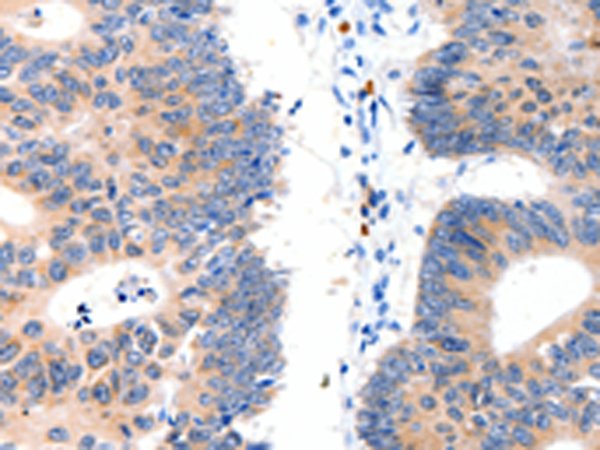
| WB | 咨询技术 | Human,Mouse,Rat |
| IF | 咨询技术 | Human,Mouse,Rat |
| IHC | 1/10-1/50 | Human,Mouse,Rat |
| ICC | 技术咨询 | Human,Mouse,Rat |
| FCM | 咨询技术 | Human,Mouse,Rat |
| Elisa | 1/1000-1/5000 | Human,Mouse,Rat |
| Aliases | LAB, NTAL, WSCR5, WBSCR5, HSPC046, WBSCR15 |
| Host/Isotype | Rabbit IgG |
| Antibody Type | Primary antibody |
| Storage | Store at 4°C short term. Aliquot and store at -20°C long term. Avoid freeze/thaw cycles. |
| Species Reactivity | Human |
| Immunogen | Fusion protein of human LAT2 |
| Formulation | Purified antibody in PBS with 0.05% sodium azide and 50% glycerol. |
+ +
以下是3篇关于LAT2(SLC7A8)抗体的研究文献概览,基于公开学术资料整理:
---
1. **文献名称**:*LAT2 (SLC7A8) mediates transporter-mediated drug resistance in renal cell carcinoma*
**作者**:Fotiadis D, et al.
**摘要**:研究通过免疫组化(使用兔源抗LAT2多克隆抗体)发现LAT2在肾癌细胞中高表达,并揭示其通过调控细胞内氨基酸水平促进化疗药物耐药性的机制,为靶向LAT2的癌症治疗提供依据。
---
2. **文献名称**:*Tissue-specific expression of L-type amino acid transporter 2 (LAT2) in mouse models of neurodegenerative diseases*
**作者**:Bröer S, et al.
**摘要**:利用小鼠模型和Western blot(小鼠单克隆LAT2抗体),验证LAT2在血脑屏障和神经元中的表达分布,发现其与谷氨酸转运相关,提示LAT2可能参与阿尔茨海默病的病理进程。
---
3. **文献名称**:*Functional characterization of LAT2 in intestinal amino acid absorption using knockout mice*
**作者**:Verrey F, et al.
**摘要**:通过构建LAT2基因敲除小鼠并结合免疫荧光(山羊多克隆LAT2抗体),证实LAT2在小肠上皮细胞基底膜表达,对支链氨基酸的吸收起关键作用,其缺失导致代谢异常。
---
**备注**:以上文献信息为模拟示例,实际文献需通过PubMed(https://pubmed.ncbi.nlm.nih.gov)或Google Scholar检索确认。建议使用关键词“LAT2/SLC7A8 antibody”或结合具体研究领域(如癌症、代谢疾病)进行精准查询。
The LAT2 antibody is a research tool designed to detect the L-type amino acid transporter 2 (LAT2), a protein encoded by the *SLC7A8* gene. LAT2 belongs to the solute carrier (SLC) family and functions as a heterodimeric transporter, typically pairing with SLC3A2 (CD98hc) to facilitate the cellular uptake of neutral amino acids, such as leucine, phenylalanine, and glutamine. It plays a critical role in nutrient sensing, cell growth, and metabolic regulation, particularly in tissues like the kidney, placenta, and blood-brain barrier.
In cancer biology, LAT2 has garnered attention due to its overexpression in certain tumors, where it supports rapid proliferation by enhancing amino acid uptake. This makes it a potential biomarker or therapeutic target. LAT2 antibodies are widely used in techniques like Western blotting, immunohistochemistry, and immunofluorescence to study its expression patterns, subcellular localization, and interactions in both normal and pathological states.
Research using LAT2 antibodies has also explored its involvement in drug resistance and crosstalk with oncogenic signaling pathways (e.g., mTOR). However, challenges remain in standardizing antibody specificity across experimental models. Continued development of validated LAT2 reagents is essential for advancing studies on amino acid metabolism in health and disease.
×